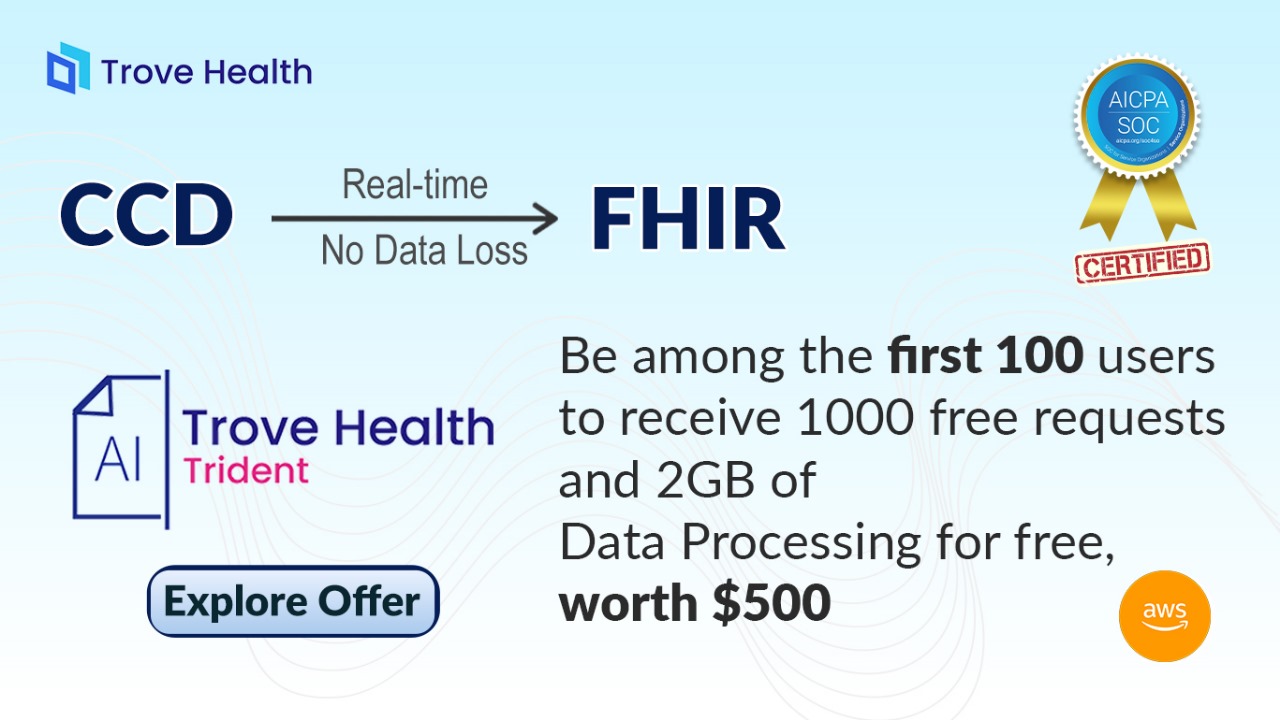Need a Demo?
Write to us and one of our friendly staff will promptly schedule a demo
hello@trovehealth.io
What are the benefits of TEFCA?
TEFCA stands for Trusted Exchange Framework and Common Agreement. Office for National Coordination of Health IT published TEFCA in the year 2022.
Broad goal of TEFCA
The broad goal of TEFCA is the ensure that comprehensive health information of patients is instantly made available to clinicians (for treatment access) and also to the patients (for patient access). Research has shown that better healthcare outcomes can be achieved when comprehensive healthcare data is available at the point of care.
Background of TEFCA
Approximately 66 percent of US healthcare costs are currently related to treating patients with numerous illnesses. Since the data is siloed with providers treating specific illnesses, it is unlikely that a single physician treating the patient is likely to have a comprehensive view of the patient’s health. Interoperability and data sharing are going to be more and more important for providing good healthcare as populations throughout the world age and people live longer. According to the Agency for Healthcare Research and Quality in the US, at least two chronic mental or physical disorders affect two out of every three older people.
Since more than a decade, providers in the USA have been wanting to have a process for seamless exchange of health information across the United States. This nationwide, bi-directional exchange of health information is called the interoperability of health records. CMS, the Office for National Coordination on Health IT (ONC) and the healthcare industry together worked to publish the Trusted Exchange Framework and Common Agreement (TEFCA) to facilitate interoperability of health records in the US.
What happens when health data is not available at point of care?
Not having access to patient’s health data when needed could have serious consequences. Lack of access to health data can cause a population’s or an individual’s health needs to be misunderstood, that can result in subpar results and more expensive treatment. Health data has always been difficult to acquire and exchange securely. Health data is sensitive and needs a high level of privacy and security, which makes sharing it challenging.
ONC’s leadership in TEFCA and healthcare interoperability
The ONC claims in its national roadmap that the adoption of electronic health records (EHRs) has skyrocketed in the US. Less than half of hospitals are integrating the data they receive into unique patient records, despite the fact that many hospitals now regularly have access to medical information and patient data from outside sources. Therefore, even while access to crucial clinical data has increased, much work still needs to be done to unite stakeholders and build an integrated data ecosystem. Health-tech vendors for healthcare interoperability have taken leadership in TEFCA implementation across the US.
Better interoperability in healthcare would enable enterprises to cease thinking of people as patients one day, health plan members the next, and app users the next. Instead, industry decision-makers would be able to begin examining how people obtain and use health information, regardless of its source, in order to promote better service models, pursue improved patient safety, and enhance the experiences of the clients they serve.
Benefit of TEFCA for healthcare organizations
Healthcare interoperability and TEFCA benefits healthcare organizations by enabling doctors and other healthcare professionals in getting a fuller picture of their patients. This also speeds up the delivery of healthcare that eventually improves the healthcare experience.
Benefits to Payors
With interoperability in healthcare, Health plans would have a better knowledge of their utilization rates and demand for services if health information systems were more interconnected.
Benefits to Governments
Access to demographic data would allow government service providers to identify trends and address the needs of their constituents.
Benefits to Pharma and Life Sciences
With healthcare interoperability, Life science firms would be able to use substantial datasets to facilitate quicker, more accurate research.
Trove Health-Leading vendor for healthcare interoperability in USA
Trove Health was founded the on notion of solving provider’s problems in health information exchange by offering plug-n-play API for nationwide bidirectional healthcare interoperability as per CMS guidelines for treatment access as well as patient access! With millions of records exchanged per month & thousands of Care Providers connected, Trove Health not only imports the desired records but also automatically parses them into a format of your preference for ease of consumption.
What providers say about ‘Healthcare interoperability with Trove Health’
“Working in a Federally Qualified Health Center (FQHC) in Brooklyn, it is amazing to be able to access the health records of my pediatric patients using Trove Health’s Patient Atlas Dashboard. I have parents who take my patients to the local hospitals in my area for pediatric emergency care, but forget to bring the discharge paper work to their visit with me. Using Patient Atlas, I am able to access the emergency visit encounter in order to provide a continuum of care for my patients and their families in my office. As a pediatrician, I recommend other providers using Patient Atlas to access the electronic health records of their patients as well.”
Dr. Anise Joseph, MD
Board Certified Pediatrician LaSante Health CenterDid you not find what you were looking for?
Let one of our friendly support staff assist you. Please fill in the form.

